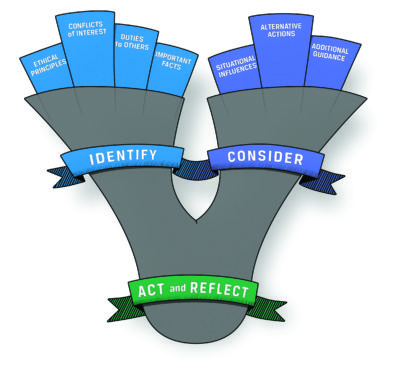Ethics in Practice: Just Being a Shrewd Investor. Case for Week of 13 November
Analysis of this week’s case now available below.
Are your ethical decision-making skills improving? Keep on practicing with this week’s case.
Case
Sung Kook “Bill” Hwang is the founder and lead portfolio manager of Tiger Asia Partners (TAP) and Raymond Park is a trader for the firm. TAP is participating in private placements for both Bank of China and China Construction Bank stock, and the placement agents shared confidential information with Hwang and Park about both companies. In the days prior to the private placement, Hwang directed Park to make short sales in each stock. TAP earned $16.2 million by using the discounted private placement shares they received to cover the short sales. Park’s actions were
- acceptable because he was following the orders of his superior.
- acceptable because he used a short position rather than trading in the bank stock itself.
- acceptable if the placement agents did not require a confidentiality agreement covering information about the private placements.
- unacceptable because the trade was based on material nonpublic information.
Analysis
This case relates to trading based on material nonpublic information (MNPI). CFA Standard II(A): Material Nonpublic Information prohibits members who have MNPI that could affect the value of an investment from acting or causing others to act on that information. Hwang and Park received MNPI about the bank stocks from the placement agents as part of the offering process. Park is not exempted from the requirements of the standards simply because his boss directs that he violate laws or ethical standards, so answer A is not correct. Park should have advised Hwang that the actions he was being asked to take were unethical and likely illegal and refused the directive to trade. The prohibition on using MNPI goes beyond the direct buying and selling of individual securities and extends to any related derivatives (e.g., swaps or option contracts), mutual funds, other alternative investments, so answer B is not correct. It would have been advisable for the private placement agents to ask Hwang and Park to sign a confidentiality agreement, establish a “fire wall” around the disclosure of that information, and agree not to trade on the information. But even absent such an agreement, Park is prohibited from trading on MNPI, therefore C is incorrect. Because the trading was based on MNPI, the trade was improper and Park’s conduct is unacceptable — answer D.
This case is based on an enforcement action by both the US SEC and the Securities and Futures Commission of Hong Kong.
Have an idea for a case for us to feature? Send it to us at [email protected].
More About the Ethics in Practice Series
Just as you need to practice to become proficient at playing a musical instrument, public speaking, or playing a sport, practicing assessing and analyzing situations and making ethical decisions develops your ethical decision-making skills. To promote “ethical exercise,” we are excited to introduce Ethics in Practice.
Each week, we post a short vignette, drawn from real-world circumstances, regulatory cases, and CFA Institute Professional Conduct investigations, along with possible responses/actions. We then encourage you to assess the case through the lens of the Ethical Decision-Making Framework and the CFA Institute Code of Ethics and Standards of Professional Conduct and let us know which of the choices you believe is the right thing to do and why. If you are not a CFA Institute member, you can post your choice and reasoning in the comments section below. For CFA Institute members, we would like you to join the conversation in our new Member App and post your responses there. Later in the week, we will post an analysis of the case and you can see how your response compares.
CFA Institute Member App
The Member App gives CFA Institute members access to a content from multiple CFA Institute publications, including these weekly Ethics in Practice posts. Best of all, the app allows in-app submission of Continuing Education credits, which members can earn by reading and participating in the conversation for each case. (0.25 CE, 0.25 SER). The app is available in the Apple and Google Play stores. After downloading, simply log in using your CFA Institute website credentials (e.g., [email protected] + password). Hint: Save the post to your library in the app to find it easily.
If you liked this post, consider subscribing to Market Integrity Insights.
Image Credit: ©CFA Institute


option D. unacceptable because the trade was based on material nonpublic information.